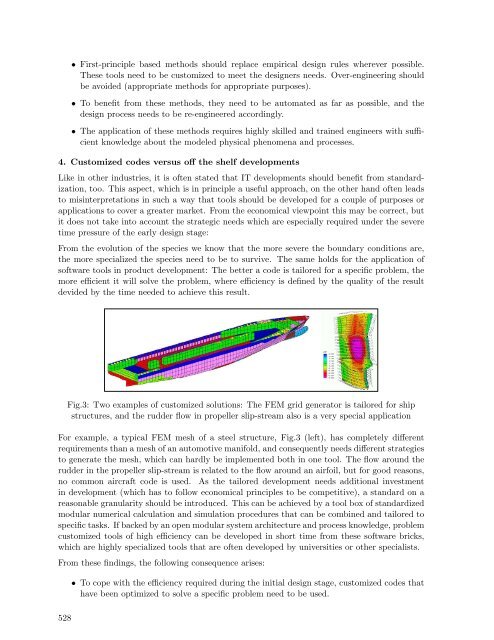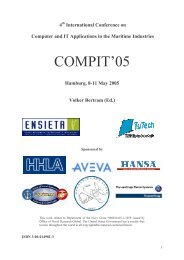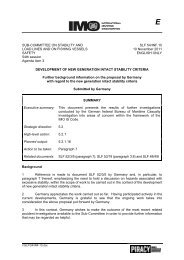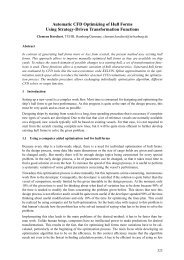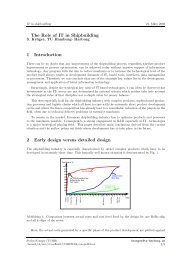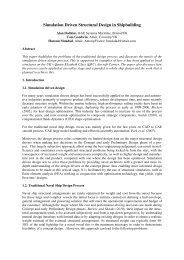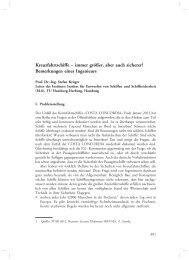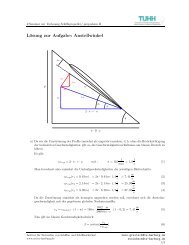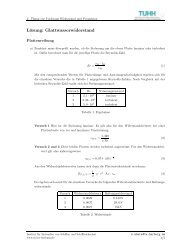- Page 1 and 2:
!""# $%& '() *!
- Page 3 and 4:
D*7=4 0? """$ # 4%398
- Page 5 and 6:
!
- Page 7 and 8:
% $###:#%##&#%##& :*#A&**&*#*$&# %
- Page 9 and 10:
*bnd.dat " && *# #' tmp.dx " *#!
- Page 11 and 12:
) *# &# **& ## # *& # #* $%&*##.*&
- Page 13 and 14:
# This part defines the used script
- Page 15 and 16:
! ! !" # ! $! % & " '"
- Page 17 and 18:
− − &#!#!!!- !!# &#"!&#! &
- Page 19 and 20:
.1 ! ! #! ##! 1 # 1
- Page 21 and 22:
!#!&#!#&#! /#! # ! !#
- Page 23 and 24:
! ! # &#! #! ! !)0
- Page 25 and 26:
− − !# !*+$ !# !!# #!!# !##!
- Page 27 and 28:
− − *1 # #! ! .#
- Page 29 and 30:
!"# # $! ! " % " !" !! &$ %
- Page 31 and 32:
$&. "" ,'"$!! $! "$ !! "$ "C!$
- Page 33 and 34:
'" ! ! '" $ $! ' ! $!
- Page 35 and 36:
,G ! B ! $ B ,)! B %
- Page 37 and 38:
,;>F! ( '"B$ B$ $$"! 4 5 '
- Page 39 and 40:
J' %# K F$ " ' " ' $ " ' '
- Page 41 and 42:
.#/)3)0# 40*# (% ) ! #' # ## !!
- Page 43 and 44:
(%&% * 3$! ! ! ##' ## # #!($)*
- Page 45 and 46:
# ! ! # * 0 ! # ! !!!#/E=9E-E
- Page 47 and 48:
.%' !!!! !!! ! !# ! ' (#,*# # !$
- Page 49 and 50:
7 7 7 & 7 " = = =
- Page 51 and 52:
$ $ #$ $ ) # >+$ -:" #J
- Page 53 and 54:
" 5∆" A -∆" ∆" -∆ ∆
- Page 55 and 56:
!" # $! %&' ()(* !"# $%!&$'() ((
- Page 57 and 58:
+(@ + +, +,( - 0, 1 + ,
- Page 59 and 60:
(%CD9#%!# +(/#0#51+#( 3* - /82/-
- Page 61 and 62:
,-C+, A# I% I3 I 9#< %=3 35 . 9#=
- Page 63 and 64:
+,#=+ #(;01(,3(3 (4+ 3 %&(++:3(34+
- Page 65 and 66:
++ ++#(/ +,03(%+,!(5+,!(+1,# ,(
- Page 67 and 68:
+ + ++D9 82/- , :+ , -8
- Page 69 and 70:
$@ -8(7(88(F(OF--"(2(0%&&=1( -(+(
- Page 71:
9 !' ' ###'+') +'#! ! #!# ' ! (.
- Page 74 and 75:
! ' !'&* 9:;' ) 'A! '!'!&7 -#!9
- Page 76 and 77:
'H' 2? 2?D (#< :!1& *%&%* * 0
- Page 78 and 79:
D ! #!&*!!' ( ' ( #= ( 2? (( '
- Page 80 and 81:
5' ,6! !&* + , !!( ' , ( ) !#
- Page 82 and 83:
+% , +%$% 6,#! C '(# (!, (
- Page 84 and 85:
! ! " # $"%
- Page 86 and 87:
%"""" """D"""." "/""5""".""" "."
- Page 88 and 89:
+# ." "'()(39::/""" 0 0/3/
- Page 90 and 91:
"". /""""""34/ """ 0 "3"""""" 0 3"
- Page 92 and 93:
3F 36 0 " " . 0 " " 0 "0 '" "
- Page 94 and 95:
!"# $%&'()$ *+,&'() &-() ./01-(2 +'
- Page 96 and 97:
) ")# " 2 )9 $) "$%$ )$%!-# )25$
- Page 98 and 99:
9 $#+ # )# ))$# ") # ) ) >""!
- Page 100 and 101:
D +2"$"!! D +2"$" , "8 9 "8 ' 2
- Page 102 and 103:
"2+$#!% ## )$ !"* )"$) $ #N "N!)"#
- Page 104 and 105:
&.!(: ! &% % % #0 !'&"" #)"%$)
- Page 106 and 107:
106.0% WEIGHT 105.0% ∆w/3 ∆w/4
- Page 108 and 109:
! "
- Page 110 and 111:
5 # # ' # + ! "#
- Page 112 and 113:
+ ' # + ! + '#
- Page 114 and 115:
!I05 !# ! # 8! 12* 05 8 ++! +N
- Page 116 and 117:
03 #! !+# #3 '#' !# ?8 0 8
- Page 118 and 119:
!
- Page 120 and 121:
)* " * * ! ! ") 5 o 2"#
- Page 122 and 123:
o - " + 1 /)* *# ! ) ),
- Page 124 and 125:
o F "LL%$ " ! " $ $ o F
- Page 126 and 127:
' ' : 4P 3 >3 ' E E E ': E E E I P
- Page 128 and 129:
''51 $ , 1 ' J!# 1 4 6- 6- -
- Page 130 and 131:
;C4 , !4 4 . ( ( ; I , .@; ,!@5
- Page 132 and 133:
"! >3 F " # F + "
- Page 134 and 135:
5# ## # 6 2# ##2 # !74% ##
- Page 136 and 137:
#$ # # % $# .!(# # 2 2#$ #&'&
- Page 138 and 139:
# # # - % % # $ #0 %#! *&I&,JK
- Page 162 and 163:
!""#$%&"
- Page 164 and 165:
A% )* 3 3 "8'!8A9 5 "8'!8A9 ( (
- Page 166 and 167:
)* $ $' ' Q ; E A ? '? 'A '
- Page 168 and 169:
'% !!! ( * ( ) )* >
- Page 170 and 171:
."'" 7 879 ')) % ) 2*
- Page 172 and 173:
) !?! .5>C81 A%K>%+ ) ;" >&7C 7 *
- Page 174 and 175:
4>$>! "@ C!PC&A!"? 8@ >&'! $@ 4&!>8
- Page 176 and 177:
,11:- > ,119-!& ( "("% ,11:-
- Page 178 and 179:
,-,*-,"- ;D! B G?,-??,*-3???,"-D
- Page 180 and 181:
!(" 3 3 " 9?? !(" ) ( ;,- ,-
- Page 182 and 183:
8$/6#@>E8/ N&%(&( )) 0 ) 8
- Page 184 and 185:
&$ " /# ! &-.//.")#% " #"),
- Page 186 and 187:
($ ) ! /22 #'&"#)## %#"##
- Page 188 and 189:
)## ##&)# - # )*) # # #"#
- Page 190 and 191:
# ) # /& " # 4 #& ?L
- Page 192 and 193:
# # )* ) # %) #" ) & "%##)*%#)* ")
- Page 194 and 195:
# # )* ) # %) #" ) & "%# #)*%#)* ")
- Page 196 and 197:
!"#$ !%"%!& '#( )* $ *% *# + &%$
- Page 198 and 199:
- # ,,/ # . 6- # #,$%&'(
- Page 200 and 201:
'" & . , ,$%&'(&)*&+(./9 -#
- Page 202 and 203:
#,#--! " -, ( & 5 ,# (5-/% ( 9 ,
- Page 204 and 205:
# "# % %#("" "# " #%#
- Page 206 and 207:
#" > * % #%"# " "# " #" # "
- Page 208 and 209:
# #' %**# ( ""*## -( #' %
- Page 210 and 211:
! ! " ! "
- Page 212 and 213:
)" ! ) ! & @
- Page 214 and 215:
?7F @ %( 5 67 & & %&( ) &
- Page 216 and 217:
) %( ) -
- Page 218 and 219:
& (JK- !&- &3 - < '
- Page 220 and 221:
!" # $
- Page 222 and 223:
# $ :+ $ ",---%$ ".///%/$
- Page 224 and 225:
# & $
- Page 226 and 227:
:C :C7= ? ./ . :E7 /
- Page 228 and 229:
# " " " "
- Page 230 and 231:
%% & +E +- +
- Page 232 and 233:
@ C = / +C + C 3 = = 4 JB JB JB
- Page 234 and 235:
* 08;! BF /!B?8 46F #?8 6 1+,,,2
- Page 236 and 237:
, ** " % ) * * * %*) * * *" %
- Page 238 and 239:
** ) % ) ** " %* *%" 9 * *
- Page 240 and 241:
A * * * %)*.,*2>* &$+
- Page 242 and 243:
• )=#,= ** • H • • )
- Page 244 and 245:
. 0 4 0 (4 +' ( 0 "0 -22 ( 0 32
- Page 246 and 247:
• " ) @--1--% >, " % , * )
- Page 248 and 249:
!#$ % -!!3!!0 !!! :! !!*!+!*!!!!-
- Page 250 and 251:
#9#- !1'67 #79/1'1-"=%1"1!=8C==
- Page 252 and 253:
!*!!!*/1'1-8 " !0 !$%! !!" !!!!*!
- Page 254 and 255:
#6691!! /" J=8/ DK 51.,/J42 -J,
- Page 256 and 257:
- /01 201 ) " + &
- Page 258 and 259:
! @ 9 : $ "!#! ! - --
- Page 260 and 261:
$$ • % - • > -
- Page 262 and 263:
$/ - - ##*!!%# 5
- Page 264 and 265:
( 2!% K '
- Page 266 and 267:
• *% • .((*%*% • .(%**1&%(%%
- Page 268 and 269:
('( #(*)%*(%)#& %(*.((%%( *%*.('*%
- Page 270 and 271:
=2;*+(** (E(A *F % ) *(% )( *+/ .(
- Page 272 and 273:
.() '%%*(%) *(% )*%( ()*** (* (%*
- Page 274 and 275:
=2'%*(** ((%****(*+-2 • = * * (
- Page 276 and 277:
%%*%')#%))%* )% ))(%?+)?%()* )( (
- Page 278 and 279:
! " ! # ! ! !"#!$#"!%"#""&!"
- Page 280 and 281:
""!"!"'$!!!#!!!("$!1:"#"" "&&'!! &
- Page 283 and 284:
"( 0$"'&"E- C "!$#'"D- C4444,44444
- Page 285 and 286:
*!+!, - - +)' ##' &&' " & 0#&
- Page 287 and 288:
,#&&&#'# &#"# # "" '"#" $ " #
- Page 289 and 290:
VOYAGER This section describes wave
- Page 291 and 292:
#'# &# ># &# #"#""-' #$' ''## &'"
- Page 293 and 294:
'#$ ># $'" ' # & '" ' #
- Page 295 and 296:
$#"# & #&#$ "+#") ""#'## # #$$##"
- Page 297 and 298:
!
- Page 299 and 300:
& % & & ! # %& 4 A % & " * # $%
- Page 301 and 302:
'("(! ## # !% & ( % ! ' !
- Page 303 and 304:
! % " & # $ 0 !
- Page 305 and 306:
' 1 ' &@ %
- Page 307 and 308:
*0 & % & * 4
- Page 309 and 310:
= ⋅ + − = ⋅ + −
- Page 311 and 312:
:: = − + + + ρ
- Page 313 and 314:
: (( ! ( ($ -! '?.'@@? 8D
- Page 315 and 316:
! @-3::4 ( $ $! $ > $5 8< " #
- Page 317 and 318:
# (( ! $$=! @ ,@ ?.6,.6 A6+,E7
- Page 319 and 320:
-! !$ $! $! !# ( #! ! $ (
- Page 336 and 337:
! " #
- Page 338 and 339:
.8' $!"!( $%$'' "'''"! !!"$ !"$"$"
- Page 340 and 341:
( !!" !! -" $"$. " % !$ !$ "
- Page 342 and 343:
& '%! %$%&=%"'!!!( &K'L"K!-+F .%!/4
- Page 344 and 345:
$M7,!!&$""! $%$%% #; '()))* $7 8
- Page 346 and 347:
8%&!&"$'("$!!%!!$%!$%( "&%%& ;',---
- Page 348 and 349:
# ; =: BJF6: F B8+S6T( ,F ;-/444.
- Page 350 and 351:
!" !
- Page 352 and 353:
*'&* *5-'(*=% %' '3% .** " % *@
- Page 354 and 355:
)2***%**' * 2)!**.' 0%*?55',0%&&3
- Page 356 and 357:
' 11 2* > ' ?EFB** *%*** **
- Page 358 and 359:
45 !!F47" A-20-G2 45 **''#$ '*'*
- Page 360 and 361:
1' * * ' * *3% • 1*'3% ' '.*3%
- Page 362 and 363:
!"# $%
- Page 364 and 365:
$) 67=8$ $ 6;' >$8$ 6*; 6; 6?3
- Page 366 and 367:
-2 ?0#'$&'' 1 ! 8$ '&$ $' $&)$
- Page 368 and 369:
@($&''$ 3)$&(&$#$ 8' 6&& ; 4
- Page 370 and 371:
-. $) '$$& #'$ &$#$$7?6 $) #'
- Page 372 and 373:
2()) 5 ! -. $) # $&$ $& ' &$ &$
- Page 374 and 375:
614 7 $ $ $ #'$ )$ #$# # &
- Page 376 and 377:
-2?0#' $&)$$#$'&$ ( #' #'$ $))#$
- Page 378 and 379:
(:"#" #"" ""#"2$""$$. ""##$"#$ ""#
- Page 380 and 381:
""##"#$ """ ..#"# "##"###$"" """"#$
- Page 382 and 383:
:# #" J " ## 2 " ."""# #$"
- Page 384 and 385:
."-"# ""## " """ ""#$ #"# ##"# C A
- Page 386 and 387:
I,3K1FF4E***5( :!= 2 ! FFF	O#@)
- Page 388 and 389:
=9%> 3 #! !' # # $ & #!!!#####
- Page 390 and 391:
%
- Page 392 and 393:
)!!!#''!'' !'!%!'#!&!. !#!!#!'$0!#
- Page 394 and 395:
% !#' ! # ( '! ' 04B1 ! :!A %
- Page 396 and 397:
*# ''=9%>#!'!$!##!' !#!'!'&(. !(
- Page 398 and 399:
47D*>1( 477*?1' &&! #! 47A*?=,
- Page 400 and 401:
! !" ""!""!#"# #
- Page 402 and 403:
+ ""!$"0" "$!"!" $!""!" " 4 "
- Page 404 and 405:
$"* • #""!!""!"1!"2 • 9"""!"
- Page 406 and 407:
(&&' / 4!"#0""!"!"!+!"#0" $"#0" "
- Page 408 and 409:
Weight / Time - Diagram 120 % 100 %
- Page 410 and 411:
0 ! 0& 1 0&& $ $ " ""!
- Page 412 and 413:
0& """"!!"!!! #"/ !"!! ""!!""!*
- Page 414 and 415:
: ! "$"##""! &!!" ! $ !# "" %
- Page 416 and 417:
#!!() *+' +"""%'$$&-"%$ "2+67-$&$
- Page 418 and 419:
! /5*//-L "$$ ($$$%$/0 &$*//-$""3M
- Page 420 and 421:
% $ " '% 2$ $ " % "%
- Page 422 and 423:
2!#!!, &$$$$%"$ "$"1 "$ %$$"$$%$ +
- Page 424 and 425:
""$%""" 3+" 4+ " "$$/E %0$$$%%" "$
- Page 426 and 427:
!*% !%"! %" 1 "! ! 22 3456
- Page 428 and 429:
! / (B; " & " !"
- Page 430 and 431:
! " " $ 9"
- Page 432 and 433:
!" #$
- Page 434 and 435:
9#$%. 0$!#$%. ) 0 !!(!!!!!$% 9#$%
- Page 436 and 437:
'% $% ! ! !!;!1.;10 $% $2$! 1
- Page 438 and 439:
7
- Page 440 and 441:
7A21 2$ ! 4(!"5! !*0 4 !$ $ !
- Page 442 and 443:
• *+ (*7'/ • 7 • "'! 1+ (!$((
- Page 444 and 445:
!"# $""%&! !'! $""%& !'! $""%&(
- Page 446 and 447:
#!$ % ##/ #"(#/"#"//'; • /#4/
- Page 448 and 449:
&# ## " ' ( # "/ # 4' "# #(#
- Page 450 and 451:
$##("'# ,# (""''&# ! # ,#)#'!$&1!!
- Page 452 and 453:
!A;3 ,## /!?;"/( 0 $ #" "& 7>
- Page 454 and 455:
+' #4 ( # # 1 # #'# # (" / #2"
- Page 456 and 457:
!9>; '##(& ""#"'"##(&"# $'$%B?A$%B
- Page 458 and 459:
'# $%B?A $%BB>H# /!9C;''##'#$%B
- Page 460 and 461:
-./ # $ 0
- Page 462 and 463:
# 3" $$ CB%$ " 4
- Page 464 and 465:
$$ ":$ $ $&$$ %$ 0 $ %$
- Page 466 and 467:
$ $ #3"6 $ 5"$ ": $ 2
- Page 468 and 469:
#$$ -# /# " $ 4- 4 " $$ /
- Page 470 and 471:
$3 $ $ • ) , * / #
- Page 472 and 473:
! ! ! !" !
- Page 474 and 475:
@@!"/ # !!@!@*"!+!!, "! ! A "!!
- Page 476 and 477:
= ( 7 ⋅8 ) − 7 ⋅8 [ 7
- Page 478 and 479: # , " (") +++/0" , +, + ! 1 1
- Page 480 and 481: % # -# .# ( (( #$ ( $ ((
- Page 482 and 483: " "# % (+ +$ ( ( ( )*
- Page 484 and 485: '( # ( & (- #((( # ( ( (
- Page 486 and 487: + $ ( ( + %$ + 8
- Page 488: (8
- Page 491 and 492: # %%%*% * 5 3 6. &78
- Page 493 and 494: , & ' "# ' *" ' ' & *
- Page 495 and 496: (%/) $ "*"& % %'% '# 5 ' %&7%
- Page 497 and 498: % # & & % ' 57 ' ' 57%M&*8
- Page 499 and 500: *3 -%%' ' JBK:%9C o #3%&-%%' %&J0
- Page 501 and 502: 0 B ' * ' *&%&* & % & % ' ! "
- Page 503 and 504: ')+( ! """ " " ! %" ,
- Page 505 and 506: ""% % ' . . (
- Page 507 and 508: -91)" 32#,000' !!! ' ) * *0"
- Page 510 and 511: "2+++ "1 =E>E=EEE1 =E>E1 , " C =9
- Page 512 and 513: W -=14" "
- Page 514 and 515: -=218%""1" -=918%""1"
- Page 516 and 517: !" #
- Page 518 and 519: +%) # ( +%$%,# $$ "$" B" "$ ) $
- Page 520 and 521: $#' $.' $"$" "#' # "$ $ ('#'"#". .
- Page 522 and 523: '7M "99 '" ##"- $G#'"#$# - $7
- Page 524 and 525: -%# ## :0*0 2 " " / # #
- Page 526 and 527: 2. Early design versus detailed des
- Page 530 and 531: This shows that the development of
- Page 532 and 533: Fig.6: Simultaneous engineering dur
- Page 534 and 535: ! !"#$ #%& ' # "
- Page 536 and 537: &$#$ ?+* # ) ) ) $ # ()
- Page 538 and 539: 2 -( $ $ < # $ )$*)$$+
- Page 540 and 541: 1500T Roll press jobshop Stock Cutt
- Page 542 and 543: ! ! "
- Page 544 and 545: 0 *$ !$$!$ $ $ $ #$ ! 4 $$& !
- Page 546 and 547: !' 0 $4#9$$(:#*$7 4 #!#$
- Page 548 and 549: 0 &$ !9=)( #!!#$*$!$$!$ $# 2!0 !&#
- Page 550: COMPIT'04 !"# #$$% &


